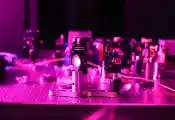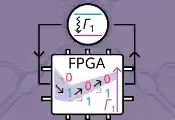Quantum Sensing Milestone Draws Closer to Exquisitely Accurate, GPS-Free Navigation
August 13, 2024 -- Peel apart a smartphone, fitness tracker or virtual reality headset, and inside you'll find a tiny motion sensor tracking its position and movement. Bigger, more expensive versions of the same technology, about the size of a grapefruit and a thousand times more accurate, help navigate ships, airplanes and other vehicles with GPS assistance.
Now, scientists are attempting to make a motion sensor so precise it could minimize the nation's reliance on global positioning satellites. Until recently, such a sensor—a thousand times more sensitive than today's navigation-grade devices—would have filled a moving truck. But advancements are dramatically shrinking the size and cost of this technology.
For the first time, researchers from Sandia National Laboratories have used silicon photonic microchip components to perform a quantum sensing technique called atom interferometry, an ultra-precise way of measuring acceleration. It is the latest milestone toward developing a kind of quantum compass for navigation when GPS signals are unavailable.
The team published its findings and introduced a new high-performance silicon photonic modulator—a device that controls light on a microchip—as the cover story in the journal Science Advances.
As the technology gets closer to field deployment, the team is exploring other uses beyond navigation. Researchers are investigating whether it could help locate underground cavities and resources by detecting the tiny changes these make to Earth's gravitational force. They also see potential for the optical components they invented, including the modulator, in LIDAR, quantum computing and optical communications.
The team's grand plan—to turn atom interferometers into a compact quantum compass—bridges the gap between basic research at academic institutions and commercial development at tech companies. An atom interferometer is a proven technology that could be an excellent tool for GPS-denied navigation. Sandia's ongoing efforts aim to make it more stable, fieldable and commercially viable.




































